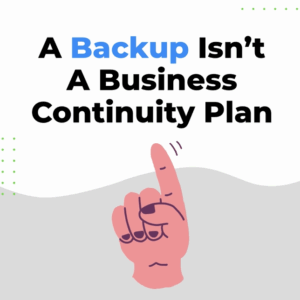 Power outages. Cyberattacks. Server meltdowns. Hurricanes. They rarely come with notice—and when they do hit, they hit hard.
Power outages. Cyberattacks. Server meltdowns. Hurricanes. They rarely come with notice—and when they do hit, they hit hard.
Too many small businesses believe that having a backup is enough. But when disaster strikes, simply restoring a file won’t keep your business running. If your team can’t access systems, work remotely, or communicate with clients, what starts as a small disruption can quickly snowball into lost revenue, broken trust, and even legal trouble.
Here’s the truth: Your IT provider shouldn’t just be backing up your data. They should be preparing your business to survive and operate through anything.
🔁 Backups Are a Start—But Continuity Keeps You Moving
Let’s be honest—backups are critical. But on their own, they won’t help you recover fast enough.
What you really need is a Business Continuity Plan. That’s the strategy that keeps your business functioning during a crisis—not just recovering afterward.
When your office is flooded, your servers are fried, or a cyberattack locks you out, a backup file sitting on a hard drive does nothing without a plan to access, restore, and run operations.
📊 Backups vs. Business Continuity: Know the Difference
Here’s where most businesses misunderstand the assignment:
-
Backups help you restore your data.
-
Continuity helps you run your business—no matter what.
A solid continuity plan answers questions like:
-
How quickly can we get back online?
-
Where does the team work if the office is gone?
-
Which systems do we restore first?
-
Who takes charge in a crisis?
And it includes essentials like:
✅ Encrypted, off-site, and immutable backups
✅ Prioritized recovery timelines (RTO/RPO)
✅ Remote access and cloud-based systems
✅ Redundant infrastructure and internet failover
✅ Regular simulation and disaster testing
If your IT partner can’t talk you through each of these confidently, you’re not prepared—you’re just fortunate nothing’s broken yet.
🚨 Real Disasters. Real Businesses. Real Consequences.
This isn’t fear-mongering—it’s happening right now:
-
Florida hurricanes forced hundreds of businesses offline—those without cloud systems couldn’t even respond to customers.
-
North Carolina floods wiped out on-prem servers and financial records.
-
California wildfires destroyed offices with no off-site backup—no way to recover.
-
Ransomware victims across the country discovered their backups were never tested—or worse, also encrypted.
Disasters don’t discriminate. They impact businesses of every size, in every zip code.
💬 Questions You Should Be Asking Your IT Provider Today
What would happen if your office was gone tomorrow?
Here’s what to ask:
-
If ransomware hits us, how fast can we bounce back?
-
Are our backups tested? What’s actually included?
-
What’s our plan if a fire or flood takes out our office?
-
Is our continuity setup compliant with industry regulations?
-
Can we serve clients if everyone has to work remotely?
If those answers aren’t clear—or worse, you haven’t asked them—it’s time to take action.
🧭 Disasters Happen. Downtime Doesn’t Have To.
You can’t stop every storm, power failure, or breach. But you can decide how well you respond.
A good IT provider helps you recover.
A great one makes sure you never skip a beat.
🔍 Ready to Know Where You Stand?
We offer a FREE Network Assessment to uncover weaknesses in your business continuity setup—and show you how to fix them before something goes wrong.
👉 Click here to schedule your FREE assessment.
Let’s make sure the next disruption doesn’t stop your business in its tracks.
